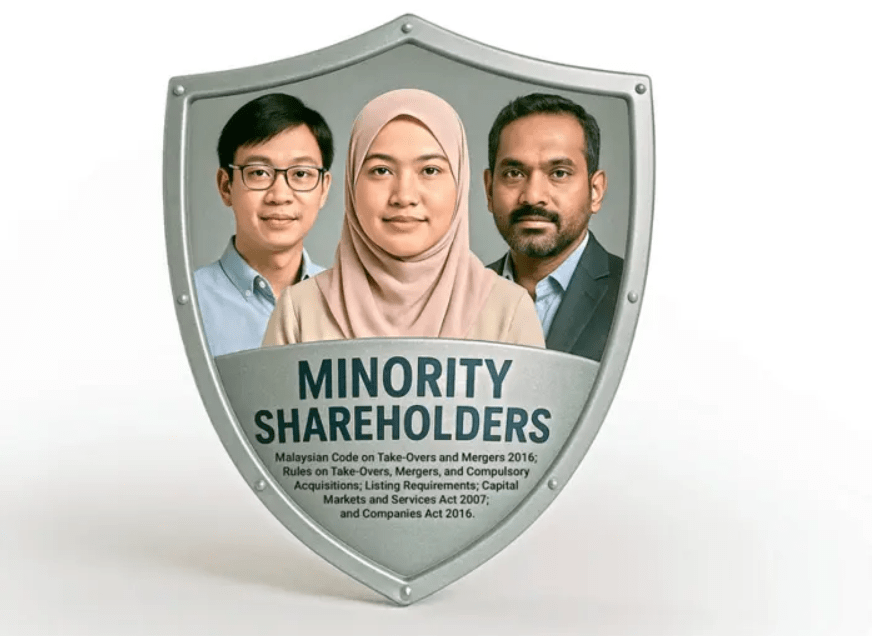
In an era where capital markets demand both agility and accountability, the decision to delist a public company is as consequential as it is complex.
As shareholders and boardrooms weigh the merits of privatisation, the integrity of the process and its impact on minority shareholders must remain front and centre.
For the exchange (Bursa Malaysia Securities Bhd), my regulation team and I are cognisant that privatisation initiatives serve legitimate commercial objectives, but they must never compromise investor protection.
Our regulatory framework, meticulously aligned with prevailing securities laws, is designed to ensure that shareholders are not merely apprised of developments but also sufficiently empowered to make decisions that align with their pecuniary interest.
Modes of Privatisation and Oversight
Privatisation can take several forms – mandatory or voluntary general offers, schemes of arrangement, selective capital reductions or voluntary delistings.
These are governed either by the Malaysian Code on Take-Overs and Mergers 2016 and Rules on Take-Overs, Mergers and Compulsory Acquisitions or the Listing Requirements (LR).
Regardless the mode or privatisation, three core safeguards underpinning investor protection are consistently applied:
- Timely and transparent disclosure | Listed companies must promptly announce any privatisation proposal (and at each material stage), ensuring shareholders have sufficient time and information to evaluate their options.
- Higher approval thresholds | Privatisation proposals are subject to stringent shareholder approval or acceptance thresholds – often requiring 75% or more of disinterested shareholders to vote in favour, with dissenting votes capped at 10%.
- Independent advice | An independent adviser must be appointed to assess the fairness and reasonableness of the offer. Their analysis includes both quantitative (pricing) and qualitative (terms) evaluations, ensuring shareholders receive a balanced view.
Takeover Offers and the 90% Rule
A takeover offer can be carried out in several ways:
- Through a compulsory acquisition, where the offeror secures at least 90% of the voting shares not already held, enabling it to acquire the remaining shares under Section 222 of the Capital Markets and Services Act 2007.
- Via a scheme of arrangement, compromise or amalgamation or selective capital reduction, which requires approval from a majority in number and 75% in value of disinterested shareholders, with no more than 10% voting against the proposal.
The terms of the offer – such as the offer price, acceptance threshold, listing status, and suspension notice – are clearly outlined in the offer documents and related announcements, which are made publicly available on the exchange’s website.
Under the LR, if an offeror receives 90% acceptance in a compulsory acquisition and announces its intention to delist the company, the exchange is required to suspend trading in the listed company’s shares five market days after the offer closes.
This rule is not discretionary, and the regulation team applies consistently to ensure regulatory clarity and certainty.
It’s important to note that suspension and delisting are separate processes.
While suspension happens automatically under the specified conditions, delisting only occurs after the listed company submits a formal application and meets all necessary requirements.
Voluntary Delistings
Where a listed company seeks voluntary delisting, we have put in place stringent safeguards to protect shareholders:
- Approval by a majority in number of shareholders, representing 75% of the total number of shares held by such shareholders, and objection must not be more than 10% of the total number of issued shares held by the shareholders.
- Provide reasonable exit offer (cash or otherwise).
- Must include detailed independent advice circular commenting on the fairness and reasonableness of the delisting and exit offer to facilitate shareholder decision-making.
These requirements ensure that even in non-takeover scenarios, minority shareholders are not left behind.
Delistings – PN17 and GN3
When a company is delisted due to its failure to comply with the regularisation criteria under Practice Note 17 (PN17) or Guidance Note 3 (GN3) of the LR, it underscores the importance of timely and transparent corporate rehabilitation.
PN17 and GN3 exist to safeguard market integrity by identifying financially distressed issuers and requiring them to undertake structured recovery plans.
Failure to meet these obligations, while regrettable, is a necessary enforcement action to protect investors and maintain confidence in the capital market.
In such instances, it is essential that affected shareholders are kept fully informed, and that their rights – particularly in relation to asset realisation or potential recourse – are respected throughout the process.
What Shareholders Should Do
It is, therefore, incumbent upon shareholders to assiduously monitor the trajectory of their listed investments, particularly as they navigate a privatisation or delisting exercise.
By maintaining a vigilant and informed stance, shareholders are better positioned to comprehend the unfolding dynamics and determine the appropriate course of action prior to the eventual delisting of their investee companies.
What Happens After Delisting
This is a question that is asked at every Bursa Malaysia AGM!
Upon a company’s delisting, it naturally exits the direct regulatory purview of the exchange.
However, it is crucial for shareholders who opt to retain their investment to understand that their interests remain safeguarded under the Companies Act 2016.
This legislation ensures a continuation of fundamental shareholder rights, including:
- Receipt of audited financial statements: Investors are entitled to regular and transparent financial reporting.
- Notification and attendance at shareholder meetings: The right to be informed of and participate in critical company deliberations.
- Voting on company decisions: A continued say in the direction and governance of the entity.
- Entitlement to declared dividends: The right to receive distributions of profits, should they be made.
- Engagement with management: The ability to pose questions and provide feedback on the company’s operational and strategic management.
- Access to company documents and records: The right to inspect certain corporate information for due diligence.
Furthermore, shareholders retain a significant voice in pivotal corporate actions.
They must be consulted and their approval is required for major decisions such as the issuance of new equity, the acquisition or disposal of substantial assets, or transactions involving directors or significant shareholders.
The article was first published by The Star.
Photo by Michael Jasmund on Unsplash.

 5.0
5.0 





















